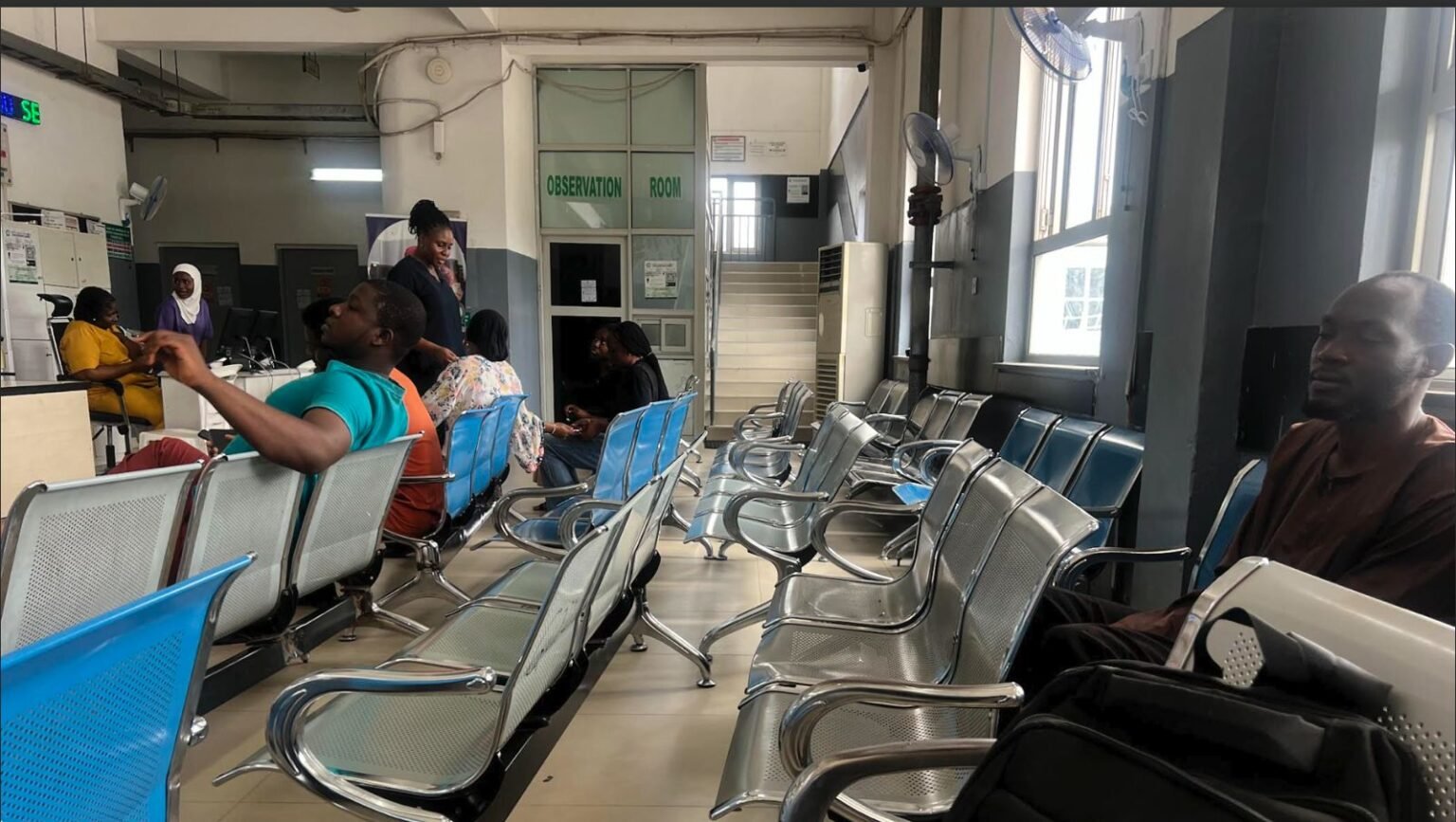(By Mariam Ileyemi, Qosim Suleimon, Chinagorom Ugwu, Fortune Eromonsele, Oluwakemi Adelagun, Saviour Imukudo, Anas Dansalma, and Pascal Ibe)
The nationwide five-day warning strike by the Nigerian Association of Resident Doctors (NARD) has crippled services in public hospitals across the country, leaving patients stranded and in some cases, desperate for care.

At the Federal Medical Centre (FMC), Jabi, and the Wuse District Hospital, Abuja, patients seeking medical care were left stranded on Saturday as the nationwide strike by resident doctors entered its second day.
PREMIUM TIMES observed a labouring woman being wheeled out of FMC Jabi to another hospital after she was denied care. The two women accompanying her lamented about the strike as they left.
A senior doctor, who asked not to be named, saw them depart and admitted he could not intervene. The doctor said he was in another ward and didn’t even know the strike had gotten this serious.
He explained that the withdrawal of resident doctors, “the foot soldiers of the hospital,” would inevitably cripple services.
Another woman in a burqa said she was attended to by a student doctor but was told her test results would not be ready until the next day.
The situation was no different at the Wuse District Hospital. The atmosphere was quieter, with only a few staff and patients around. The Radiology Unit was also locked, leaving patients stranded.
The emergency ward had only a few nurses and no doctors on duty. The waiting area was deserted except for a man lying across a seat, too tired to leave.
Strike shuts down key services
NARD began a five-day nationwide warning strike on Friday after the expiration of several ultimatums to the federal government.
The association is demanding the release of the 2025 Medical Residency Training Fund (MRTF), payment of five months’ arrears from the revised Consolidated Medical Salary Structure (CONMESS), and settlement of outstanding allowances.
NARD also criticised the Medical and Dental Council of Nigeria for downgrading membership certificates from the West African Colleges of Physicians and Surgeons.
Resident doctors make up the bulk of medical personnel in Nigeria’s tertiary hospitals. Previous strikes have often crippled services nationwide.
Patients in distress in Enugu
Activities were paralysed at the National Orthopaedic Hospital, Enugu State, where patients said their lives now depend on luck.
Nebechi Emmanuel, who suffered a fracture in a road accident, said doctors stopped treating him and other patients on Friday.
“I am usually treated daily by doctors. But since yesterday (Friday), doctors have stopped attending to patients here. They said they will resume after the strike,” he said.
“My condition is worsening due to lack of treatment,” he lamented.
Chinwe Agozie, who had been looking after her mother, said the woman’s condition worsened on Friday night, but a doctor who had been attending to her refused to respond to a distress call.
“My mother developed another condition yesterday night. We reported to nurses on duty who phoned the doctor, but he said he would not come because of the strike,” she said.
“I thought my mum would die last night. She just survived by luck and because of God.”
She added that another patient beside her mother’s bed had been bleeding heavily without attention.
“Even yesterday, the blood from her leg filled the whole ward,” she said, appealing to the government to quickly settle the doctors’ demands.
“Doctors are part of our lives. They’re lifesavers after God. The government should attend to their demands urgently.”
Another patient, Chigozie Nnamani, said: “Doctors have abandoned us. We don’t get treated anymore… patients with critical conditions are in danger.”
Hospital officials confirmed that no new patients were being accepted, not even in the emergency unit.
The situation was different at the Enugu State University Teaching Hospital, Parklane, which did not join the strike.
Overstretched consultants in Kano
At the Aminu Kano Teaching Hospital (AKTH), Kano, senior doctors stepped in to fill the void left by striking residents.
“I have been working here today, and since yesterday, when the strike began, nothing has changed. We attend to patients with emergency needs,” said a staff member at the Accident and Emergency Department.
She explained that consultants had taken over. “The senior doctors have taken over. So no single patient is unattended, as you can see for yourself,” she said.
But the General Outpatient Department told a different story. With residents absent, patients were fewer but waited longer.
“On a normal day, we usually have up to five doctors on a shift. But today we only have two doctors for the morning shift and another two for the evening,” another staff member said.
A consultant described the strain: “You see, I started my shift by 2 p.m., but the number of patients I am expected to attend to is overwhelming.” By then, she already had about 50 patients on her list.
Patients gave mixed views: some said they were still being seen without much delay, while others admitted waiting times were longer.
Uyo hospital turns back new cases
The strike has also crippled activities at the University of Uyo Teaching Hospital (UUTH), Akwa Ibom State.
A nurse at the accident and emergency unit told PREMIUM TIMES that heads of departments have begun discharging patients because there were no doctors to attend to them.
“If you check, some corners are empty. That is because we are not accepting new cases. After all, there is no doctor to cater to them,” the nurse said.
Relatives expressed frustration. “No doctor has seen her since morning,” Monday Okon said of his sick mother.
Kufre Sunday, caring for his father, added: “I pray the strike is called off because I cannot afford medical bills at a private clinic.”
The Chief Medical Director, Ememabasi Bassey, said the hospital could not accept new patients.
“Any new patients admitted now will be put at risk because there will be nobody to take care of them. The consultants are not that many,” he said.
“We are managing the patients who are already in the ward and will not be able to cope with new patients for now.”
Patients abandoned in Owerri
At the Federal University Teaching Hospital, Owerri, activities were crippled.
A woman identified as Esther said her brother, who was scheduled for abdominal surgery, had to be transferred to another hospital where the bill was N700,000. Her family had managed to gather only N200,000.
She pointed to a man lying in the ward who, she said, had not been attended to.
“Even if patients are transferred or discharged, there is no doctor to sign the papers,” she said.
After visiting several wards including Accident and Emergency, no consultations or surgeries were taking place. Only the Casualty Department was treating patients with a few doctors on duty.
More impacts in Abuja
At Karshi General Hospital, Abuja, the impact of the strike was visible. The normally busy wards had no patients, only a few staff.
A pharmacist at the hospital explained that patient turnout has drastically reduced since the strike began.
“The strike has affected many of our activities. You can even check the records; very few people have been coming since it started. The only unit still receiving people is the Accident and Emergency ward,” she said.
A nurse identified as NJ said the Accident and Emergency (A&E) unit now runs skeletal services.
“Normally, we would admit or take patients to the theatre. Now we only assess, stabilise, and refer them to private hospitals. We do not keep patients,” he said.
According to him, corps members, locum doctors and a handful of consultants were managing emergencies.
“Here we have only two or three consultants, mostly in surgical units. They handle cases like caesarean sections or deliveries, but they are available only on weekdays,” he explained.
He said for severe malaria that requires two or three days’ admission they provide an immediate injection to reduce fever and a start dose of antimalarial medication, then advise the patient to continue treatment elsewhere.
For accident victims, they suture the wounds or do initial wound care, but they will not keep patients for admission.
Despite the shutdown, antenatal and some laboratory services continued, largely under consultants.
Mixed compliance in Lagos
In Lagos, some resident doctors across hospitals showed full compliance with the strike.
A visit to some health institutions including the Federal Neuro-psychiatric Hospital Yaba, Lagos and the University Teaching Hospital (LUTH) showed full compliance, as resident doctors were not working.
At LUTH, the president of the Association of Resident Doctors, Benjamin Uyi, said the doctors’ demands were long overdue and should have been addressed earlier.
According to him, the demands of the doctors centred on prioritising welfare, to make their operations more conducive and motivating.
“Any doctor whose welfare is not met is already a risk to the patients,” he said.
“For any doctor to function optimally, his/her physical, mental health and psychosocial needs must be balanced.
“The doctors are already burnt out and faced with excessive workload and work schedule, and the government is yet to prioritise their welfare.”
However, at the Alimosho General Hospital, activity continued. A security guard said: “If there was a strike, they wouldn’t be working. The association gave FG five-day warning strike, I am aware of the strike.”
READ ALSO: NARD fumes as Kaduna govt hospital sacks resident doctors
A parent, Adeleye Isiaka, whose toddler was recently discharged from the pediatric section, corroborated this.
He told PREMIUM TIMES that the doctors and nurses “have been attending to us very well” since his arrival on Thursday around 4 a.m.
“I don’t know of other sections but here at the pediatric section, they attended to us and other people that came after us very well.”
He further said that they have a scheduled appointment next Monday for follow up and observation.
What next?
PREMIUM TIMES learnt that NARD scheduled an extraordinary National Executive Council meeting for Saturday night to review the strike.
The doctors say they remain open to negotiation but insist the government must resolve outstanding issues to avert a deeper crisis.
Read the full article here


